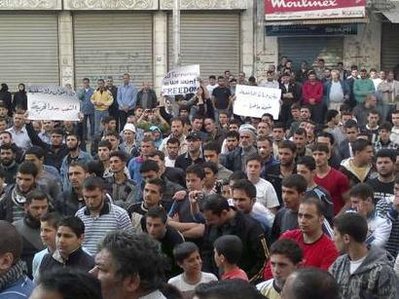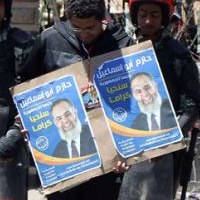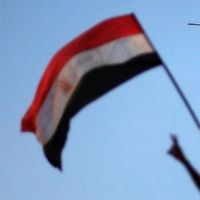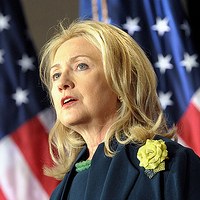![]()
Wed, April 20, 2011 | DebkaFile

Protesters gather during a demonstration in the Syrian port city of Banias April 20, 2011. The chief of security police in the Syrian city of Banias has been dismissed, a rights group said on Wednesday, after five civilians were killed in a crackdown against pro-democracy protests there last week. (REUTERS/Handout)
Assad’s Bloody Crackdown Protest Threatens Sectarian War
A DebkaFile report:
President Bashar Assad, while abrogating Syria’s detested 48-year old emergency laws Tuesday, April 19, immediately replaced them with new draconian measures banning any kind of public protest against his regime and permitting midnight arrests. His bloody showdown with widening circles of protesters is in its final act, debkafile’s Middle East sources report, and threatens to explode into a sectarian war.
In the last crucial stage of his fight for survival, Assad has persuaded Turkey, Jordan, Iraq and Lebanon to seal their borders to stem the smuggling of arms and provocateurs to Syrian opposition groups — a closure planned also roadblock the flight of hundreds of thousands of refugees from Syria in the next stage of the crisis.
State TV interrupts regular broadcasts to show horrific images of smashed bodies alleged to be of army officers and troops murdered by the protesters. The authorities are gambling on the people rising up against the protesters for laying hands on soldiers. But the risk factor is great because military personnel watching the pictures are just as likely to decide that the better part of wisdom is to save themselves rather than the regime.
In any case, debkafile’s military sources report that the decision to deploy the army for cracking down on the protests racing from city to city is a final act of despair because the troops and their officers’ loyalty to the president is far from assured.
Nonetheless it was taken Tuesday, April 19, after the heads of the regime discovered that some of the arms and fighters smuggled into Syria had been diverted from mixed-bag opposition groups to specific Syrian ethnic, religious and tribal communities who were getting ready for the unrest to change in character and tip over into sectarian warfare.
The Lebanese Druzes, for instance, are pumping weapons to their brethren in southern Syria; Lebanese Sunni Muslims are arming Syrian Sunnis in the coastal towns of Banias and Latakia; the Alawites who live mostly in the Aqar district of Lebanon are taking care of their coreligionists on the Syrian side of the border; Christians of the “Lebanese Forces” grouping are smuggling weapons to Syrian Christian villages; while Iraqi and Turkish Kurdish tribes have stepped up their consignments of weapons, fighters and activists to the Kurdish community of northern Syria.
Damascus also accuses Saudi Arabia of keeping the protest movement afloat with smuggled arms and funds.
Because his military and security strength cannot be stretched two ways — both to block the smuggling routes and suppress the raging demonstrations, Assad appealed to the King of Jordan, the Lebanese President and the heads of government in Turkey and Iraq for action to “hermetically seal” their borders. Although they obliged by redoubling their guards, it is unlikely that they can stop the arms smuggling altogether.
The opening shot for sectarian strife came from the regime itself. Tuesday, shortly after the emergency laws were lifted, Syrian Interior Minister Mohammed Ibrahim al-Shaar characterized the uprising as “an armed revolt by Islamist radicals seeking to establish an Islamic state in Syria.” Syrian citizens must “refrain from taking part in all demonstrations or sit-ins under any banner whatsoever,” said al-Shaar. “The laws in force in Syrian will be applied in the interest of the safety of the people and the stability of the country.”
More demonstrations thereupon spread across the country.
Wednesday, Iranian and Syrian sources predicted an escalation of the unrest. The fact that this information was relayed by Iranian sources indicated that Tehran had pitched in to help Bashar Assad cope with the massive opposition before it topples him.
Acting under the annulled emergency laws, Syrian security forces in civilian garb went into action before dawn Wednesday, April 20, knocking on the doors of Sunni clerics in Homs, the third largest city in the country, and taking them to out-of-town prisons. When relatives inquired about their whereabouts, officials replied they were “missing.” According to some reports, up to 100 people have been killed in Homs in the last 24 hours. The injured are hiding in private homes afraid to go to hospitals where security men either finish them off or detain them. The fate of some 5,000 detainees remains unknown and many believe several hundreds may have been killed and buried without the knowledge of their next of kin, some of them taken out of overcrowded prisons.
In Lebanon, Sunnis and other anti-Assad elements allied to opposition groups in Syria fear President Assad may send his agents to purge them too.
Associates of the ousted Sunni prime minister Saad Hariri, the Christians’ Samir Geagea and Druze chiefs have gone underground and begun evacuating their families to Europe for fear of being targeted for assassination.



 RSS
RSS










Assad’s Bloody Crackdown Protest Threatens Sectarian War | #Syria #Alawi #Assad http://j.mp/h2DzYH
Assad’s Bloody Crackdown Protest Threatens Sectarian War | Middle East news, articles, opinion and a http://fb.me/Yb21bPvl
RT @CrethiPlethi: Assad’s Bloody Crackdown Protest Threatens Sectarian War | Middle East news, articles, opinion and a http://fb.me/Yb21bPvl
RT @CrethiPlethi: Assad’s Bloody Crackdown Protest Threatens Sectarian War | #Syria #Alawi #Assad http://j.mp/h2DzYH